2020 has been a particularly tough year for the Restaurant and Bar sector. After a better than expected summer due to the Eat Out to Help Out scheme, the autumn tiered restrictions and curfews have hit the out of home market hard. Only around 70% of licenced premises were trading at the end of October and this number collapsed further when England’s second national lockdown came into force in November despite some sites remaining operational for takeaway and delivery. The rate of reopening after this second lockdown remains to be seen in the crucial run-up to the Christmas period.
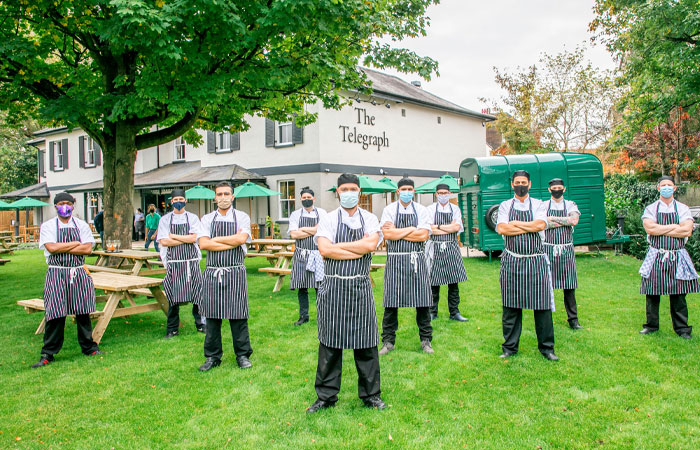
The Telegraph
However, there are underlying signs of consumer confidence as CGA reported many consumers sought to eat out ahead of England’s second lockdown. Food sales on thelast two days before lockdown were 28% and 11% up on the equivalent days in 2019 – a strong performance given nearly a third of Britain’s licensed premises were closed ahead of lockdown. CGA’s Drinks Recovery Tracker showed that year-on-year drinks sales faired less well; down by 4% and 3%, but the final day of trading saw a major uplift in sales as spirits were up 32% year-on-year, wine up 25%, and beer and cider also performed strongly. These figures suggest greater consumer confidence around eating and drinking out than there was ahead of the first lockdown in March. There is a long way to go before sales reach pre- pandemic levels, but consumer desire to eat out bodes well for the longer term.
There’s no doubt that the post-pandemic world will be different. Design Insider asked Rita Bancroft to identify top seven things that may have changed for good.
Embracing Outdoors
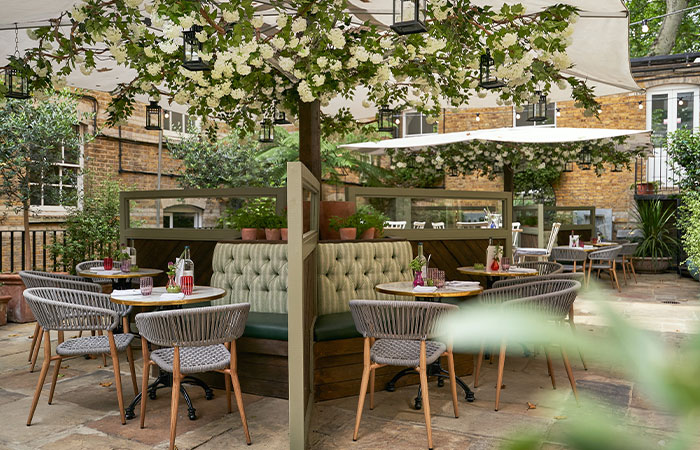
Stanley’s, designed by Concord BGW Group, furniture, and accessories by Revivalist
Outside hospitality spaces have been trending for a while and the pandemic has not only accelerated installations, it has also uplifted design. Gone are the days where a few picnic tables would have been acceptable, the outdoor space needs to be considered and dressed as you would indoors. Biophilic design is ideal for connecting indoor and outdoor spaces, but The Revivalist report a definite demand for Après ski design as we head towards winter with rugs, throws, fleeces, skins and fire pits. And its not just seating, bars are integral in creating covid secure spaces and are here to stay in a post-pandemic world.
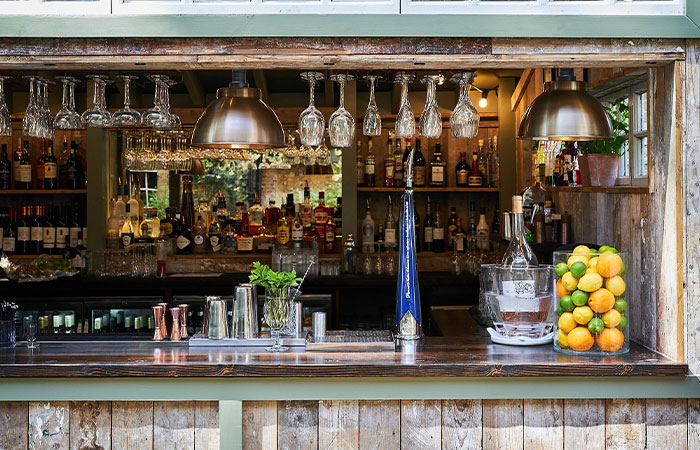
Stanley’s, designed by Concord BGW Group, furniture, and accessories by Revivalist
Exclusive Dining
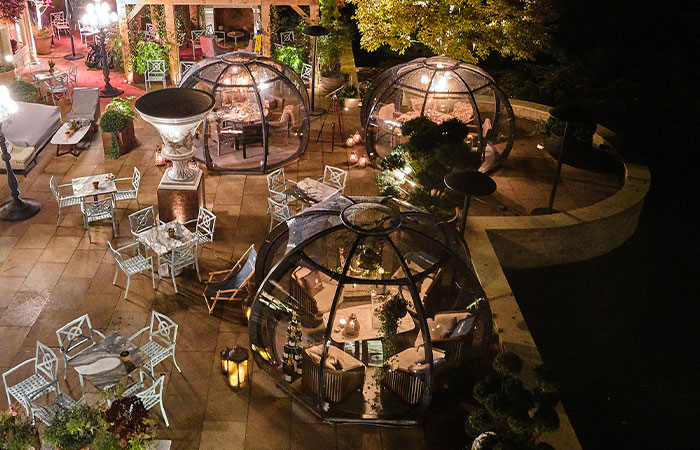
Homewood Hotel, Allpod by Tensile Fabric Ltd
The innovative design response to the pandemic leaves a positive and lasting legacy, as private dining becomes more accessible. Tensile Fabric were supplying pods well before the pandemic, to bars and restaurants in London who saw the potential of opening up their outdoor spaces in the winter months, particularly if they had a view. But since the pandemic, enquiries for their dining pods have gone through the roof. Perfect for small social bubbles while the world is social distancing, but beyond that they create a stunning feature for bars and restaurants creating exclusive private dining experiences. Heated in the winter and shading added for summer these beautiful pods can remain in place all year round.
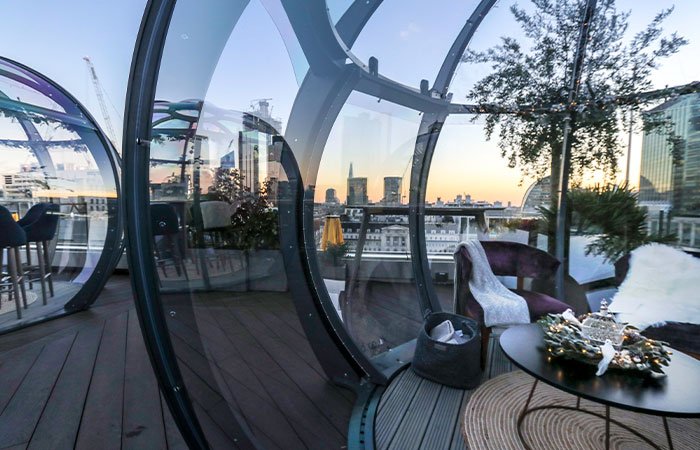
Homewood Hotel, Allpod by Tensile Fabric Ltd
At Your Service
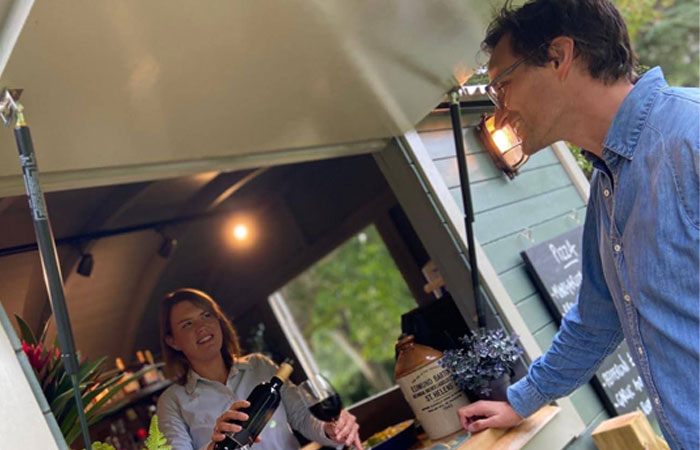
Hospitality Hut by Pod Bods
When lockdown was first announced in early spring 2020, Spatialized knew the important role external spaces were going to play once restrictions were lifted. They already had much experience installing external container and horsebox bars, but during 2020 they innovated further and expanded. This November they launched a sister company called The Pod Bods and designed a new hospitality hut solution. The Out Foxed@The Red Fox was tailor made for their garden operation with a separate kitchen and bar area. The beauty of this type of hut is it can service itself and be used as a takeout facility which is especially important in the current climate when the pubs are closed.
Beautiful Destinations
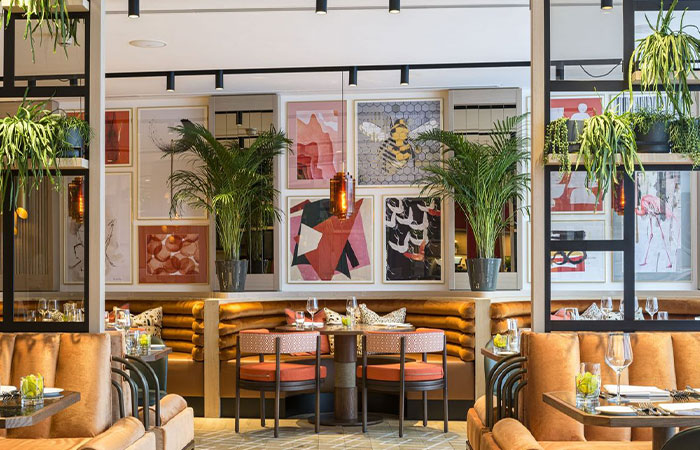
‘The River’ Restaurant at the Lowry, designed by Goddard Littlefair, artwork by Indigo Art
The power of art has become even more important in creating an ambience as unessential items are decluttered.
Indigo Art were appointed artwork consultants on the recent refurbishment and redesign of ‘The River’ Restaurant at The Lowry Hotel, Manchester. The gallery inspired interior is balanced with greenery, creating relaxed and natural surroundings. This project won this year’s Restaurant & Bar Design Awards 2020 for the ‘UK Hotel’ category and was also nominated for a Society of British Interior Designers award in the ‘Restaurant Category’. This month Indigo Art launched an online shop so consumers can enjoy sustainably produced prints in their own homes – leading us nicely to the next trend.
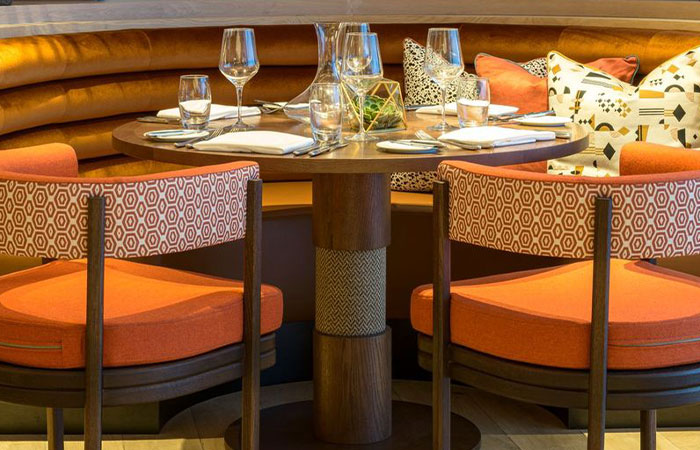
‘The River’ Restaurant at the Lowry, designed by Goddard Littlefair, artwork by Indigo Art
At Home Market

Stein’s at home
Top-end restaurants and chefs around the country have diversified into providing meals that can be enjoyed at home, and many of them plan to continue even after normal dining service resumes. Private dining experiences delivered at home are also predicted to rise as chefs offer their services for that special occasion. Staying-in may be the new going-out at the moment, but it may well transform into the ultimate exclusive dining experiences.
Truly Sustainable
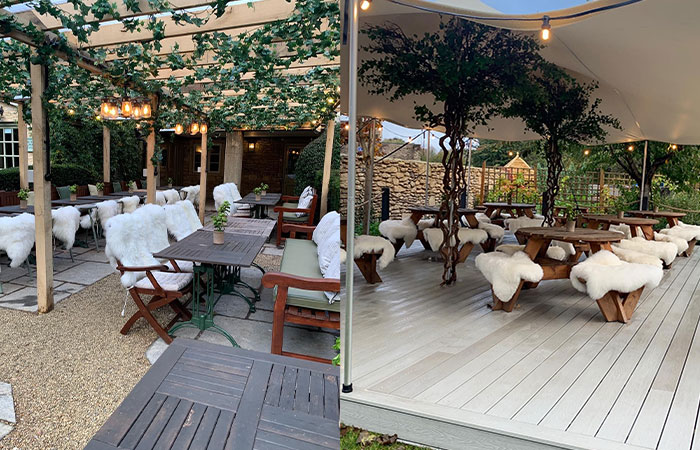
The Methuen Arms, designed by Concord BGW Group, furniture, and accessories by Revivalist
Provenance, local sourcing, and sustainability have been noticeable trends in recent years. The latest CGA report published in October 2020 shows that this pandemic has created even greater consumer focus. 67% of consumers think it is important that the brands, they visit take a responsible approach to reducing food waste. 78% of consumers aged 55+ think quality is more important than variety on a menu. 60% of consumers agree or strongly agree that brands donating surplus food to charity are more likely to get their custom, and that number is even higher among 18 to 34 year olds at 66%.
Realtime Technology
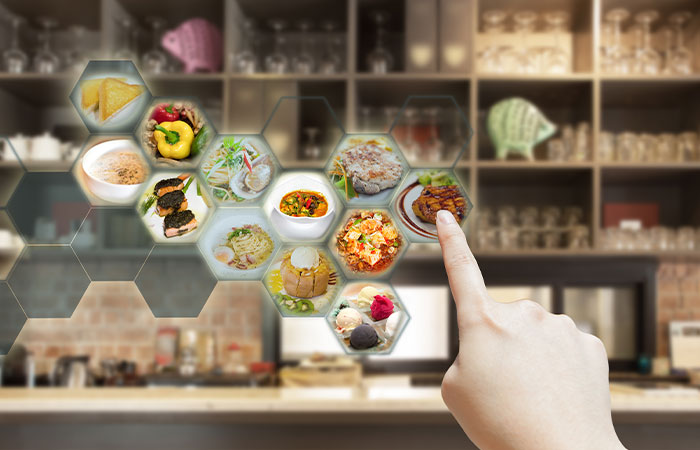
Instant TechTechnology will continue to play a crucial part in ordering and payment systems, but vitally it also plays a key role in capturing our opinions. A survey from London Research of 4,000 consumers revealed that reviews and ratings are more important than friends and family to consumers when looking for information about a company’s products or services. 84% of UK consumers consider rating or review to be very or quite important when looking for a restaurant. Google paused new reviews from being posted live during the first lockdown in March. Reviews were back online as restaurants reopened in July with similar volumes as the same period in 2019. But interestingly positive reviews were posted more often than before (87% of positive ratings compared to 78% before the lockdown for the same establishments), stabilising at around 80% a few weeks later.
Yes, 2020 has been a dreadful year for the restaurant and bar sector, but there is genuine pent up demand waiting and many positive concepts that we will hold onto as we look to 2021 with greater optimism.